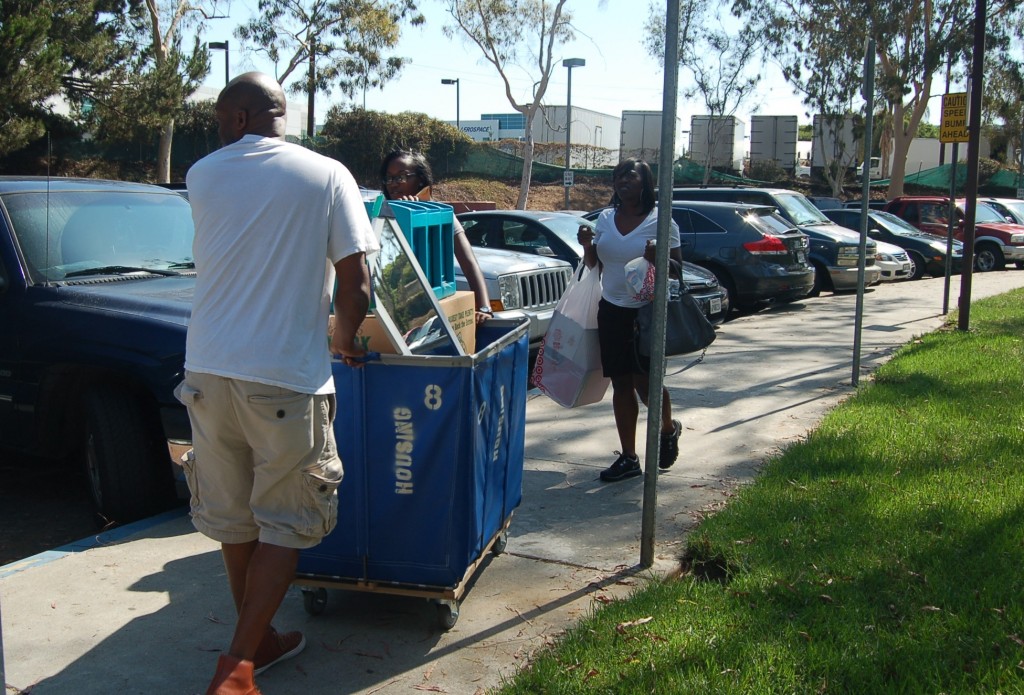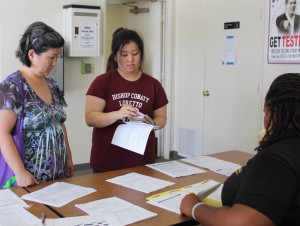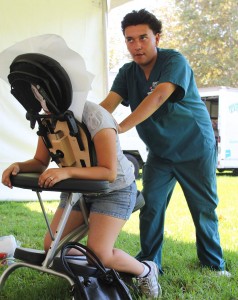
A week before the bulk of the student body and faculty returned to school this semester, a contingent of freshmen had already made themselves at home on campus. Literally. With the help of their families, the first-time California State University, Dominguez Hills students moved into University Housing.
In 90-degree weather, nearly 200 freshmen filled and ferried carts provided by housing, lugged suitcases, and carried boxes and makeshift totes to their new digs for the school year. On Wednesday all transfer and returning students new to living on campus moved in. Then on Friday all returning residents moved back in. A total of 650 students are now calling the 162 apartment units home.
Students such as Manuel Brizuela became familiar with the campus prior to moving in by attending a new student orientation session during the summer. Brizuela also met with a communications department faculty advisor to get information about the journalism program he is entering. The aspiring sports writer/analyst applied and was on the wait list for CSU Fullerton and was accepted to CSU Northridge, but decided to attend CSU Dominguez Hills.
“I chose this school, because I’m used to small schools. The environment here is pretty great,” said the graduate of Champs Charter High School in Van Nuys.
Although Brizuela’s father helped carry his belongings to his new abode, the freshman is traveling light. He said, “I didn’t bring electronics. I’ll take care of that this weekend. I just brought the essentials [today].”
It will be relatively easy for Brizuela to retrieve the rest of his belongings from his family’s home in nearby Encino. On the weekends that the freshman doesn’t return home to visit, his father, Manuel, who comes to watch soccer games at the Home Depot Center, will visit Brizuela at school.
For families who live further from campus, weekend visits will likely be more difficult.
Sofia Hoskinson, recruited on a full scholarship to play on the university women’s basketball team, hails from Citrus Heights, a community near Sacramento. Her mom, Kim, wanted to make sure her daughter had all the supplies she needed to start college, since a follow-up visit in the near future isn’t feasible.

“[University Housing] gave us a checklist of what we needed to bring and what not to bring. I probably brought twice as much as she needs,” said Hoskinson’s mother, who in time will have several opportunities to resupply her daughter.
Whether the Toro cager competes at universities in northern California or on campus, she will have one of her biggest fans in the stands. She said, “My mom’s going to come to probably every game.”
Hoskinson, who is deciding between a degree in kinesiology and business, is not only leaving behind her parents, but also her boyfriend, who is attending a college in northern California, and her sister with whom she shares a close bond.
“It’s going to be tough,” she said of missing her sister. “I’ll be using Skype and texting her all the time, and I’ll probably be on the phone with her a lot.”
In addition to family, some students have a network of peers to help them assimilate into college living.
Since graduating from Marco Antonio Fireball High School in Lynwood, Antonique Smith participated in the Educational Opportunity Program (EOP) and Summer Bridge programs, which provide introduction to social engagement opportunities as well as academic assistance to students who display the potential to succeed in higher education, to meet university admission requirements.
“It was good, because now I’m moving in and I see so many faces that I saw during the summer, so I know a lot of people,” the freshman, who is considering majoring in education or science, said of EOP.
Smith’s mother, Stacey Ridgeway (who is rooting for science as the major), was on hand to help her daughter settle into her campus apartment. She said supplemental programs have helped her daughter academically and with social aspects of college.
“I think it’s an excellent program. I encourage all students to be involved in EOP because it gives students a head start on living in the dorms and doing different activities,” Ridgeway said, adding with a hardy laugh about moving in, “I’m just going to sit here and let her do everything. I bought it all, least she can do it is put it up.”
Kidding aside, and whether or not students can appreciate it, parents such as Ridgeway care deeply about their young academics and they want to be involved in the educational process. To help them participate in a productive manner, the university’s Alumni and Family Programs office seeks to engage parents. They partnered with University Housing Services during move-in day this year to get the ball rolling.

“The hospitality suite is a new component this year. We’re providing an opportunity for parents to become acquainted with the Toro Family Advocacy Network (T-FAN). To help ease the physical stress parents go through while helping their son or daughter move to campus, we are offering coffee and refreshments, free massages, and lunch,” said Gayle Ball-Parker, director of Alumni and Family Programs.
Parker said T-FAN was established this year to help CSU Dominguez Hills parents work closely with university leaders to make sure more students have access to a college education. It also connects parents who care about student success and allows them to participate and have a role in shaping campus programs that promote higher education. T-FAN also helps give parents a voice among policy makers and the community through a better understanding of local, state and national issues that impact higher education.
The partnership between the two university entities also sets the stage for students to become alumni.
“We’re really excited that we are able to have a partnership with Alumni and Family Programs, to provide at atmosphere to get students excited about being alumni,” said associate director of University Housing Services Stephan Rice. “It’s also good to see that parents can relax and unwind as they trust us with their child as they move on to college.”
With the goal of graduation in mind, alumni programs assistant Felicia Hernandez said, “We produced and are screening a new student orientation video in the move-in day registration area to build more awareness of alumni programs, so students are thinking about graduation from the time they start college. Right now, students just want to move in, but ultimately they want to get out – to graduate, that is.”
While students are in school and living on campus, University Housing is working hard to provide comfortable environs. About a dozen apartments are undergoing upgrades this semester. Rice said this is the largest turnover of new furniture to date, and he hopes that trend will continue in order to keep the apartments up-to-date and attractive.
For immediate and urgent needs, staff was on hand during freshman move-in day to make any necessary adjustments or repairs on the spot. Rice said, “There are five [maintenance crew members] on duty, including a locksmith, to help make sure things go smoothly.”
After parents had gone and some of the dust had settled, University Housing Services hosted a mixer Monday night in the housing common area so that first-year students could relax and experience their newfound freedom with their new neighbors. But lest they lose track of their sensibilities, on Tuesday they attended a four-hour mandatory orientation meeting where “rules of the house” were handed down.
“We go over expectations about living in our community, about being adults and making positive choices, and making sure they align with their goals of being Toros,” Rice said. “This was an opportunity for the new residents to learn about the policies in University Housing, fill out their living agreements, learn how to create effective relationships with staff and roommates, and learn how to get involved in the Resident Student Association. They also received financial tips on how to save and budget their money, especially if they are [working and] getting paid once a month.”
To help students have a positive on-campus living experience, 11 trained resident assistants (RA) will provide guidance to students. University Housing Services competence coordinator Venus Lee will also work directly with residents as well as two graduate student assistants who will serve as leadership models, advising and overseeing the programmatic experience.
In the next couple of months Housing is preparing to roll out a new component of their services that utilizes StarRez, an online software program that will enable students to apply and pay for housing, help assign students to RAs, and allow students to request maintenance.
“It going to be a lot easier for students and better for Housing staff because we’ll be able keep track of things and run reports right on the system,” Rice said, adding that in general, “We’re changing the housing experience so we can help students become more engaged and help enhance their academic experience.”